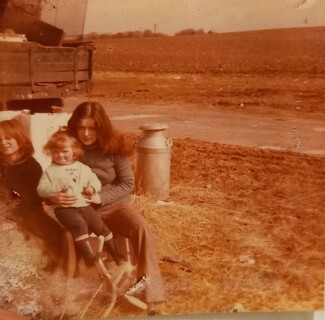Future Memory - by Charmaine McGuigan

When researching Romani history to mark Holocaust Memorial Day 2024 earlier this year, I came across an archive I never knew existed. It is called the Shoah Foundation and was started by no other than Steven Spielberg to record survivor stories from the concentration camps. The archive includes many audio recordings, produced in the late 1990’s, of in-depth interviews with Roma and Sinti people, and are about how they lived before, during and after the Holocaust.
I listened to two long interviews with Romani Holocaust survivors called Lina Jackson and Julia Lentini. The women shared similar stories of the horrors of that time, but also very different stories of their lives before and after and it is their accounts of their lives before the Holocaust that particularly resonated with me.
Lina spoke of living in an apartment in Germany and having little understanding of her Romani heritage, although she knew her father was Romani. Lina's main link with her Romani culture before the Holocaust was some of the Romani language that she'd picked up from her family.
This started to change, and was a foreshadow of the horrors to come, when Lina made an innocent remark one day to her school friend, who had commented on Lina's “beautiful dark hair.” Lina replied to her friend that her hair was down to her being “part Gypsy.” After that Lina said that “all heck broke loose,” and the children started following her home chanting a derogatory and racist song calling her a thief.
Julia spoke of the idyllic summers before the Holocaust, travelling with her family through Germany, and of being well integrated in the small village where they settled every winter. This was similar to my experience of growing up travelling.
I can also understand their stories, as it seems to me that both Lina and Julia were each initially blissfully unaware of any hatred towards them either personally, or as Romani people. It was only when I settled in houses and worked locally that, like Lina, I became aware of the negativity that exists towards the Traveller community. Not being visible or recognisable as a Traveller meant I was able to witness the negativity that existed. This often took the form of derogatory comments towards the Gypsies who frequented the place where I worked, and also in the form of neighbours making comments about Travellers without knowing that I was also a Traveller.
The racism stopped me in my tracks from saying that I am a Traveller too, and I found myself switching off. The affinity I found with the stories in the archive is that, despite this, they help us remember who we are, especially when trying to fit in, and for me that's the importance of future memory.
By Charmain McGuigan for the Travellers' Times
(Photograph: “Idyllic summers travelling” L-R Aunt Isobel Price (was McPhee), Aunt Nancy Lewis (was McPhee), and the child on Nancy’s knee is Charmaine McGuigan © Charmain McGuigan)
This article first appeared in issue 74 spring/summer 2024 of the Travellers' Times Magazine. To subscribe please follow this link